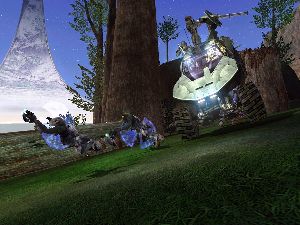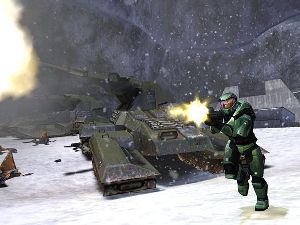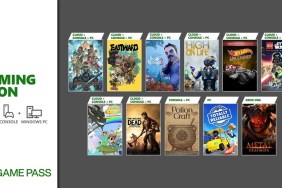Flying rings around the competition.
A few months ago, I said Halo was “…set to deliver an unprecedented
video game experience on a console.” Here it is, six months later and Bungie
has delivered the package like some digital stork on a divine mission. Is the
video game experience actually unprecedented, you ask? Let’s just say if you
plan to buy an Xbox, Halo will be on the front lines at the Battle of
I-Told-You-So. Although one game won’t win the system wars, this one puts up
a hell of a fight.
But even the Great Pyramid has its flaws albeit very few. Halo is no
exception. A dash of repetition, a smidgeon of a learning curve and a slight
prejudice to the socially challenged gamer is all that blocks the road to perfection.
As a result, we’re merely left with the best single player FPS game we have
ever played
on a console or otherwise. Oh well, you can’t win ’em all.
The drama unfolds in a distant galaxy known as Halo for the huge planet-sized
ring-like object that floats there. Humanity’s long standing war with the amalgamated
alien race known as the Covenant has brought you to Halo via the Pillar
of Autumn (a mini SDF1-sized
battle cruiser). Before long, you find yourself and a handful of crew members
seemingly stranded on the giant ring, fighting for your lives and possession
of the ring itself. Thankfully, the big metal donut has its own atmosphere,
which, incidentally, is human-lung friendly, not to mention lush and a potential
gold mine for anyone looking to invest in some vacationing property.
The story is great and progresses you through the game very believingly with
twists and turns that keep it intriguing. Thought you knew everything about
Halo? Well I bet we know something you don’t know, and we’re not telling.
Let’s just say invisible swordsmen are bad, but…oh, forget
it. From the intricate story to the well-scripted voice talent, Bungie was obviously
serious about Halo‘s delivery from start to finish.
You assume the guise of Master Chief, a cybernetically enhanced super Marine
with some very handy rechargeable armor. Offering suggestions and general navigation
is the Pillar of Autumn’s onboard computer named Cortana. This little construct
has been transplanted to your hi-tech helmet for easy transport and it plays
a vital role in Halo‘s story.
For the most part, Halo is a blend of incredibly innovative vehicle
use and traditional FPS-ing with the game’s few but impressive weapons. Standard
projectile armaments like a machine gun, pistol (w/one level zoom), frag grenades,
sniper rifle, shotgun and rocket launcher comprise the marine firepower. However,
nearly all enemy ordinances can be acquired from fallen Covenant soldiers as
well. These weapons are energy based and brutal – Covenant weapons more easily
slice through Covenant energy shields, which obviously comes in handy.
Halo‘s entire alien and terrestrial arsenal is the product of hard,
meticulous thinking and some of the guns really show this. From the Alien Needler
(which fires crystal shards that stick into an opponent only to explode moments
after) to the adhesive plasma grenades, the weaponry is a blast.
 Running
Running
and gunning is great, but where Halo really shines is the vehicle support.
There are many instances that let you drive, hover and fly across Halo‘s
gorgeous landscapes. You can hop in an all-terrain buggy (Warthog) that seats
two and is equipped with a rear-mounted gun turret. A third marine can operate
this monster to dish out some rapid-fire projectile pain while travelling at
high speeds.
Other vehicles include the Marine’s Scorpion tank and a couple alien crafts
like hoverbikes (Ghosts) and flying units (Banshees). Each vehicle handles differently
– the Warthog is the most difficult to drive due to its point-then-accelerate
control.
You really have to see Halo moving to appreciate its amazing graphics.
The textures are simply fantastic and the attention to detail is terrific. The
light sourcing is really cool – energy blasts and your teammates’ personal flashlights
illuminate the surrounding area. Plus, the cuts and grooves are endless and
dynamic. I shot down an enemy Banshee, but its rapidly descending charred husk
managed to crush me when it hit the ground and noticeably scraped the ice upon
impact. I was awestruck…and very dead.
The transition from intricate indoor to stunning outdoor areas is virtually
seamless. There are a few instances where the framerate dips just a bit, but
this is always a result of there being hordes of baddies and laser blasts dotting
the screen.
The control is the slickest and the most intuitive for a console FPS, but that
doesn’t make it perfect. Two analog sticks will quickly frustrate before they
gratify. Don’t fret, though – the relative auto-aim is great and you’ll quickly
get used to it, yet still mouse and keyboard should be supported.
At any rate, you better make do with what you got as soon as possible, because
the enemies won’t stand idle for you to get your bearings. They’re smart and
legion., two things we don’t often see in FPS games (remember Delta
Force: Land Warrior). Throughout the game you will team up with various
friendly Marine NPCs, who are a great help and add a good deal of realism to
the mix. They’ll split up, charge, grab their own vehicles, ride shotgun or
man the aforementioned rear-mounted gun turret. And most importantly, they’ll
accurately cover your cybernetically enhanced behind. Plus, their banter is
fitting, varied and often comical. 
There’s a saying: A soldier can only be as good as his greatest nemesis. Indeed,
the Marine NPCs are so intelligent because they have to be in order to deal
with the Covenant warriors. Separated into several groups possessing different
battle tactics and strategies, the Covenant are formidable adversaries. They
too will split up and try to flank you. They will often seek cover, charge or
retreat if the odds are stacked against them. Some of them have impenetrable
shields, some have cloaking devices (ala the Predator), some have swords and
many have at least two of the three.
This is just playing Halo on the Normal setting. There are still three
higher difficulty settings. I haven’t been challenged by a FPS like this since
Half-Life.
After you’ve charged through the game’s massive single player campaign, grab
a few friends and charge through it again, but with permanent backup this time.
Yep – Cooperative single player is here, and it rules. When you’re done with
that, you can choose between a slew of different multiplayer game types, including
Classic, CTF, Deathmatch, King of the Hill, Race and Oddball. In Oddball, one
character must hold a skull for a given amount of time while everyone goes crazy
trying to take him down. You can’t fire a weapon, but the skull does devastating
melee damage.
The folks at Bungie have incorporated an incredible customizing option to let
you tweak the particulars of each game type. Change the name, type of vehicles,
game time, number of kills, toggle the cloak option, make it free-for-all or
team based and so much more. Plus, the game ships with 21 presets that Bungie
thought might whet the player’s appetite a little.
We only have two real complaints about the multiplayer. For one thing, you
can’t play as the aliens. It’s always human vs. human, which takes some of the
fun away. Plus, there is no bot support. You will always need a friend with
whom to play multiplayer, and for some game types you’ll need many. Eight or
more Xboxes can be linked together for unmatched fun at those extremely rare
LAN parties. Of course, you need a TV and a copy of Halo per Xbox, which
sucks. Since the Xbox is not online yet, the lack of bot support to add more
players leaves you in something of a lurch.
But in the end, Halo has totally revolutionized how we look at console
FPS games. Before you go to that big sweat-stained sofa in the sky, you absolutely
have to play this game. It’s really the best FPS you can play on your TV. Xbox
score big with Halo: Combat Evolved.

-
Totally gorgeous
-
Obscenely entertaining
-
Massive single player game
-
Massive multiplayer game
-
Excellent vehicle support
-
Compelling story
-
No bot support







